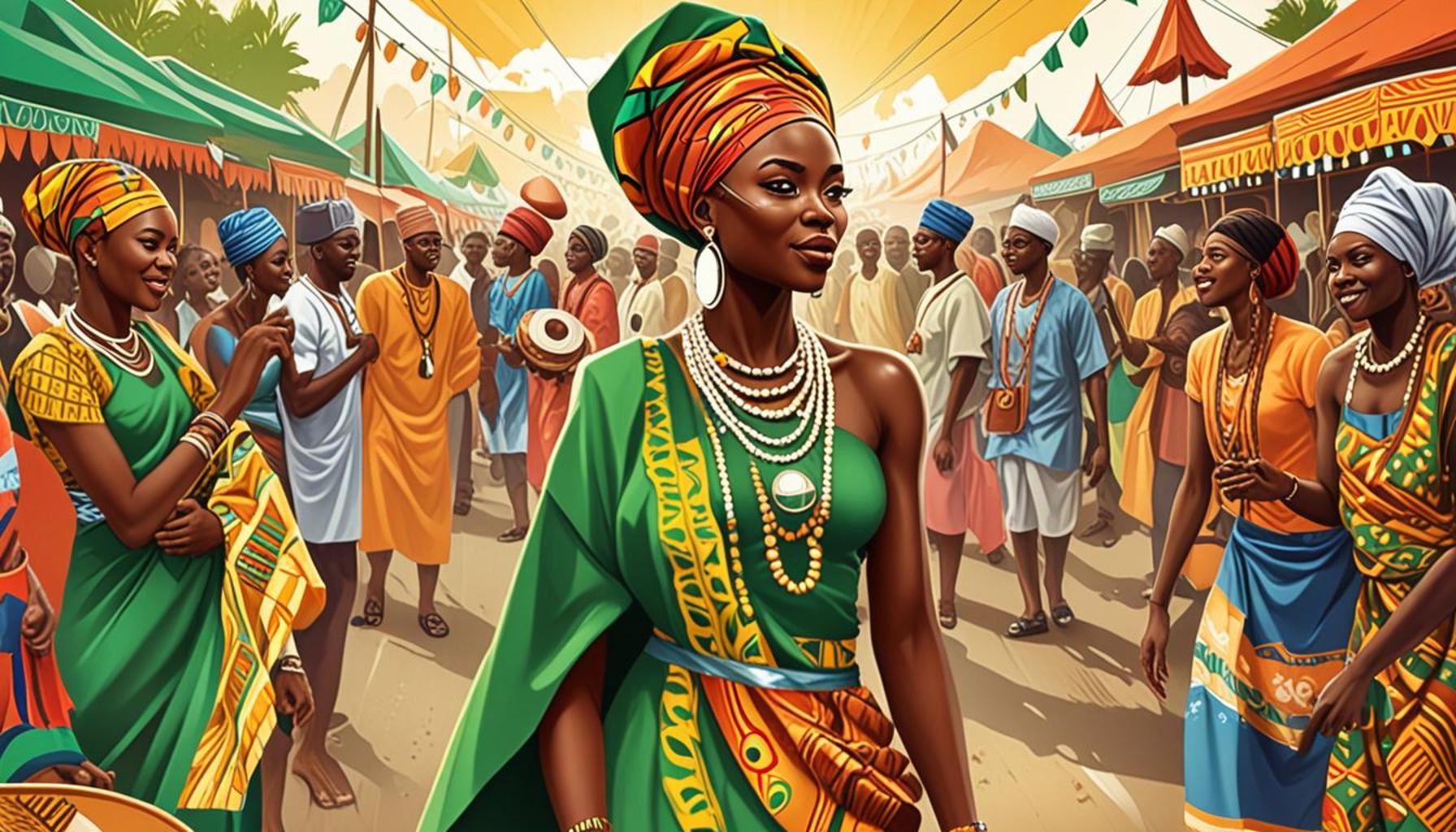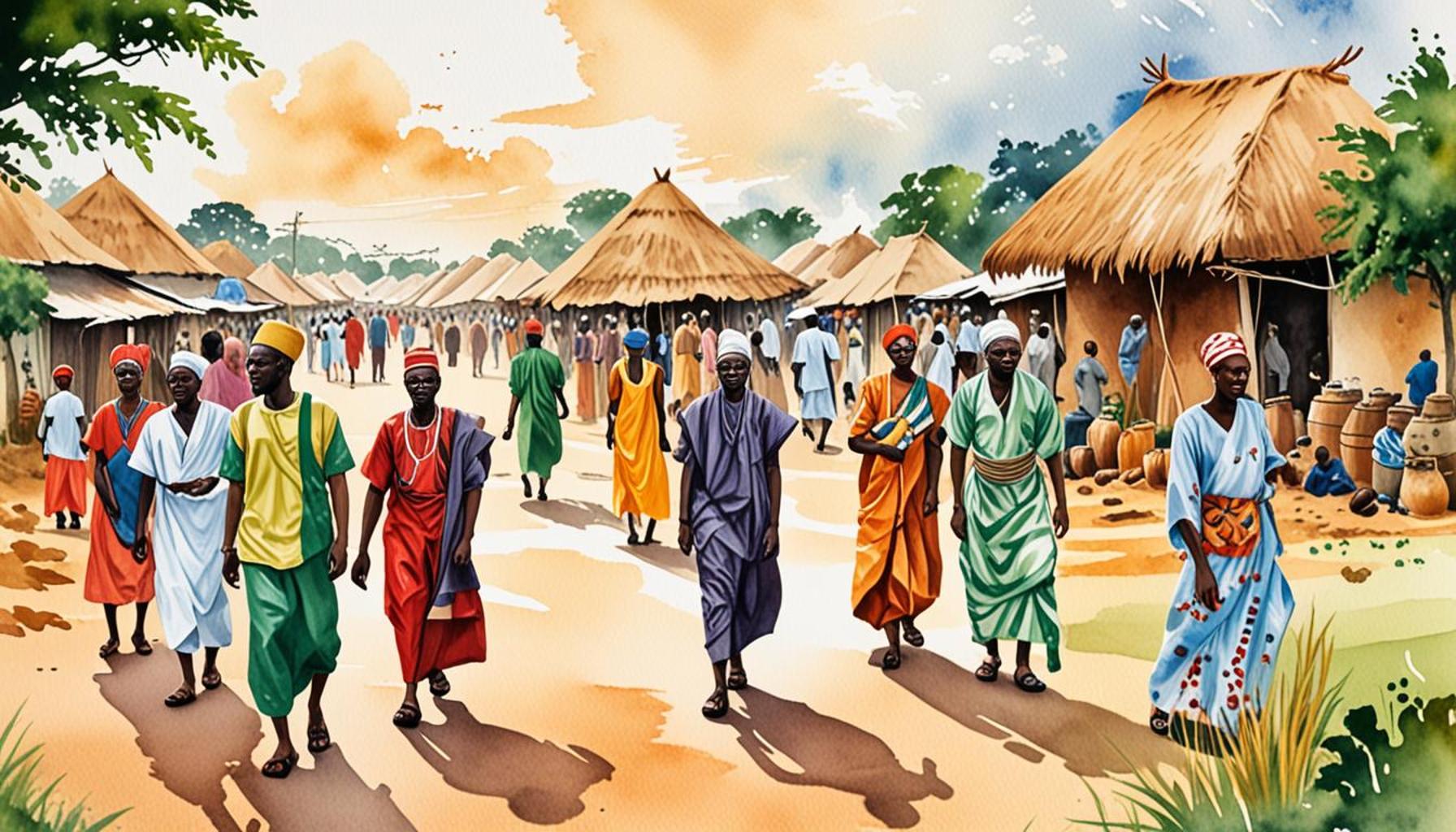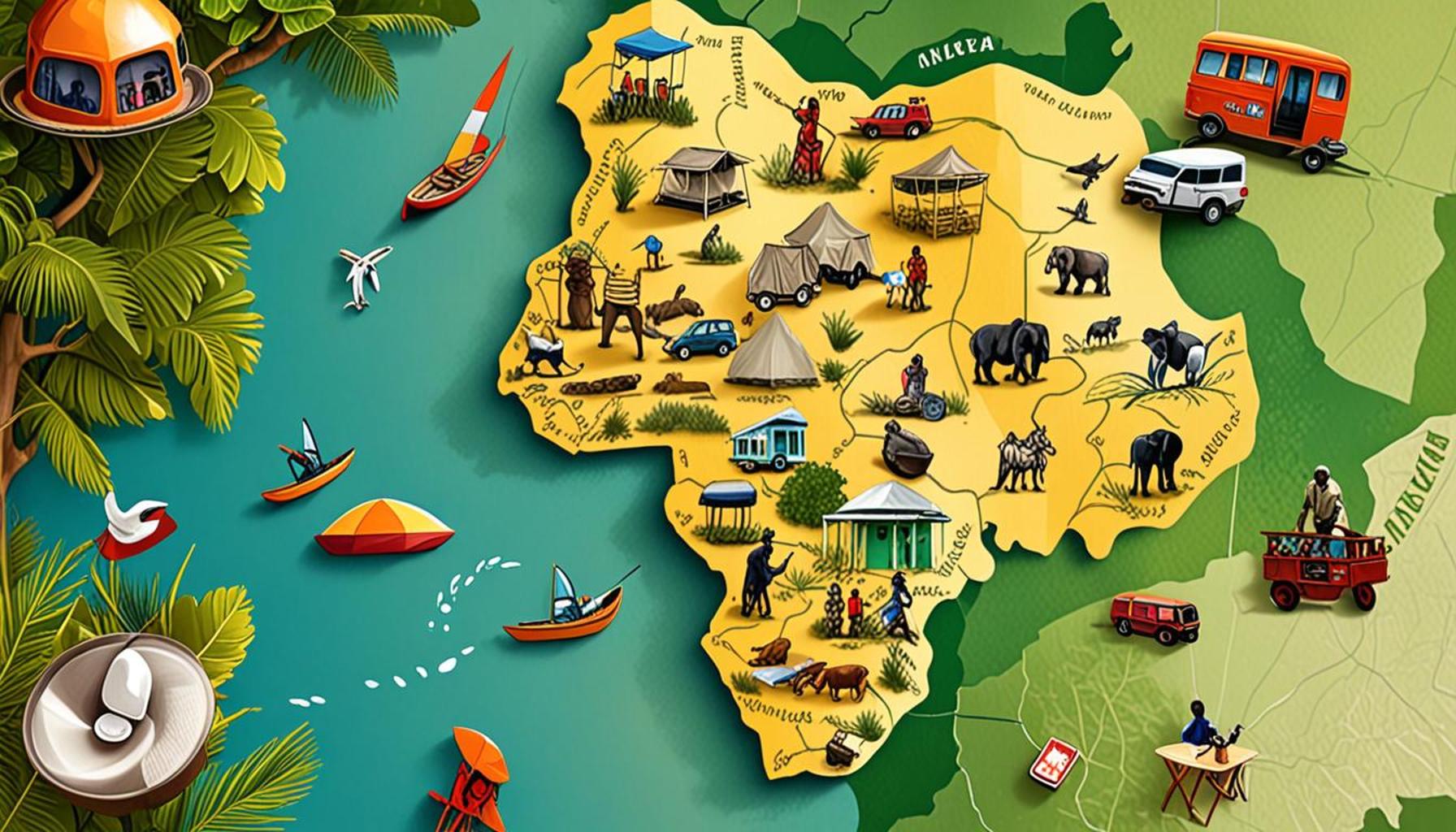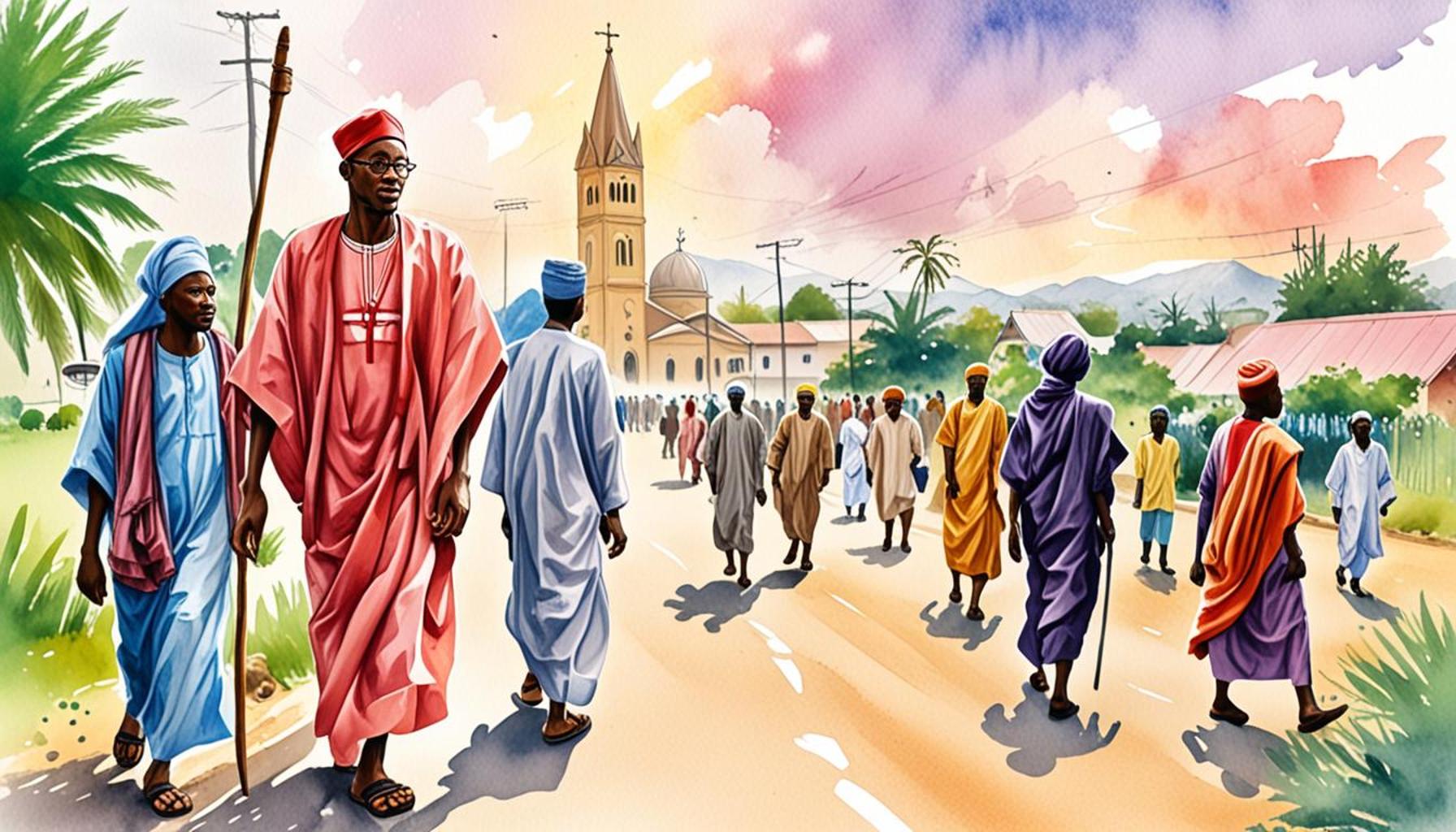Festival Itineraries: The Routes that Celebrate Nigerian Culture

Exploring the Heartbeat of Nigeria
Nigeria is a nation rich in cultural diversity, with over 250 ethnic groups and countless traditions. Each group offers unique festivals that showcase their heritage and values. As the nation celebrates its vibrant roots, festival itineraries become essential for experiencing the profound essence of Nigerian culture.
Discover the Colors and Sounds
From the bustling streets of Lagos to the serene landscapes of Enugu, festivals provide a kaleidoscopic view of Nigerian life. These vibrant celebrations are not only a feast for the eyes and ears but also a deeper insight into the values and experiences that shape the identities of the Nigerian people.
Consider these highlights:
- Osun-Osogbo Festival: Celebrated annually in Osogbo, this festival dedicated to the river goddess Osun attracts thousands of participants who engage in a rich tapestry of rituals, art, and dance. The event features a sacred pilgrimage to the Osun River, where offerings are made to invoke blessings from the goddess. The festivities last for two weeks, culminating in a grand finale that showcases elaborate costumes and performances that tell the rich origin stories of the Yoruba people.
- Eyo Festival: Taking place in Lagos, the Eyo Festival is a spectacular theatrical event that commemorates the life of a late king and signifies the transition to the afterlife. This festival boasts a vibrant display of cultural heritage with participants donning traditional white robes, symbolic of purity. The event features music, dance, and even ceremonial processions through the streets, turning the city into a living tableau of history and culture.
- New Yam Festival: Important to the Igbo people, this festival is celebrated to honor the earth goddess and the spirit of yams, which are a staple food. Traditionally, the festival marks the end of the harvest season with communal feasting featuring yam dishes, cultural performances, and dances that underscore the community’s gratitude for the past year’s abundance. The celebration reinforces kinship and communal bonds, with elders passing down stories and traditions to the younger generation.
These events are more than mere celebrations; they are gateways to understanding the values, struggles, and triumphs of the Nigerian people. Each festival tells a story, inviting both locals and tourists to partake in a shared cultural narrative. They create a sense of belonging and pride in a nation where traditions are deeply embedded in the fabric of everyday life.
Journeys into Cultural Richness
As festival itineraries unfold, they offer routes that not only connect cities but also unite communities. Traveling through Nigeria during these festive times allows individuals to immerse themselves in rich cultural experiences. The stories shared and experiences gained foster closer ties among participants, emphasizing unity amid diversity.
Join the rhythm of Nigeria’s diverse festivities and discover unforgettable traditions waiting to be experienced. Engaging with these rich cultural celebrations not only illuminates the past but also inspires a collective vision for the future, making each festival a pivotal moment in the ongoing narrative of Nigeria’s cultural heritage.
SEE ALSO: Click here to read another article
Unveiling the Festive Spirit
Nigerian festivals are more than ceremonial occasions; they are a celebration of cultural heritage that connects individuals to their history, traditions, and community. As you navigate through the colorful landscape of Nigeria’s festivals, you will discover a rich array of experiences that echo the vibrant narratives of its people. Each festival serves as a portal, inviting people to collectively engage with their roots, lend a voice to their culture, and foster unity in their diversity.
Immersing in Local Traditions
Historically, festivals have played a pivotal role in reinforcing communal ties and shared values. They express collective aspirations, celebrate achievements, and mark significant life transitions. At the core of many Nigerian festivals lies an emphasis on ancestral reverence, agricultural abundance, and the affirmation of cultural pride. Here are a few notable festivals that highlight the essence of Nigerian life:
- Argungu Festival: Known for its thrilling fishing competition in Kebbi State, the Argungu Festival showcases not just the sporting prowess of participants, but also the rich cultural heritage of the Kebbi people. As fishermen cast their nets into the Goggon River, the event is filled with traditional music, art, and dance, all celebrating the cooperative spirit associated with this ancient festival.
- Calabar Carnival: Dubbed Africa’s biggest street party, the Calabar Carnival takes place in Cross River State every December. Known for its extravagant floats and vibrant costumes, the carnival brings together local and international visitors who revel in the soulful performances and pulsating music that celebrates the rich cultural tapestry of Nigeria. The event exemplifies Nigeria’s cultural dynamism and its capacity for inclusivity.
- Festival of Arts and Culture (FESTAC): This biennial festival held in different parts of Nigeria serves as a platform to showcase artistic expressions that reflect Nigeria’s heritage. Participants from across the globe come to exhibit their crafts, dance, and traditional performances. The festival fosters artistic collaboration and encourages cultural exchanges that emphasize the importance of preserving traditional art forms.
These celebrations serve as a conduit for storytelling, providing insight into the rich legacies passed down through generations. Festivals like these integrate the motifs of community, spirituality, and diversity, while also attracting a global audience keen to experience the vibrant cultural life of Nigeria.
The Routes to Cultural Discovery
Planning a journey through Nigeria’s festival itineraries allows travelers to explore not just the geographical landscapes but also the diverse cultural fabric that shapes the nation’s identity. Each route taken during these festive periods unveils the stories of communities, their cherished traditions, and the contemporary expressions of culture. Participants are offered a unique opportunity to engage in local customs, learn traditional dances, indulge in local cuisines, and foster relationships that cross cultural boundaries.
The vibrant world of Nigerian festivals awaits; it beckons those willing to step off the beaten path and embrace the extraordinary narratives that define the nation. Whether it is through the joyous drums of a masquerade or the rich tastes of traditional dishes, each experience contributes to a mosaic of vibrant culture waiting to be explored.
| Category | Details |
|---|---|
| Cultural Heritage | Festival itineraries showcase Nigeria’s rich traditions and diverse cultures, allowing travelers to connect deeply with the essence of the country. |
| Economic Boost | These events attract tourists, generating revenue for local businesses, which in turn enhances community development and sustains cultural practices. |
Traveling through Nigeria during its festive seasons not only allows participants to witness the vivid artistry and spirited performances but also provides an opportunity to engage with local artisans and learn about their crafts. By embracing various festivals, such as the Osun-Osogbo Festival and the Durbar Festival, visitors can appreciate the multifaceted narratives that shape the country’s identity.Moreover, festival itineraries offer unique insights into the various ethnic groups that inhabit Nigeria. With over 250 ethnicities, each festival embodies unique dialects, music, and cuisine that are integral to the overall experience. For those eager to explore the diverse cultural tapestry, these itineraries serve as essential guides. They highlight the significance of communal bonds that reinforce unity among Nigerians while offering foreigners a glimpse into the celebratory spirit that enlivens the nation’s calendar.
ADDITIONAL INSIGHTS: Expand your understanding here
Journey Through Nigeria’s Cultural Tapestry
Imagine embarking on a journey that invites you to experience the heartbeat of Nigeria’s diverse cultures through its renowned festivals. Festival itineraries are not merely a sequence of events; they are thoughtfully curated experiences that enable travelers to comprehensively understand the narratives woven into the fabric of Nigerian life. Each festival is a testament to the resilience, creativity, and collective spirit of its people, and exploring these celebrations deepens appreciation for the local customs and traditions.
Exploring Festival Highlights Across Regions
Nigeria’s geographic diversity is reflected in the variety of its festivals. From the northern plains to the coastal cities in the south, each region boasts its unique celebrations, offering rich insights into local cultures. Here’s a look at some prominent festivals that form essential stops on any cultural itinerary:
- Osun-Osogbo Festival: This annual festival is celebrated in Osogbo, Osun State, and centers around the Osun River Goddess, a vital deity for the Yoruba people. The festival attracts thousands of pilgrims and tourists who honor the goddess through rituals, art, and dance. Visitors can immerse themselves in the spiritual ambiance, witnessing traditional ceremonies that evoke a sense of community and reverence for nature.
- Eyo Festival: Known as the precursor to the modern-day Lagos Carnival, the Eyo Festival is a lively event held in Lagos Island to honor the memory of deceased kings. The festival features costumed figures known as “Eyo” who parade through the city with drums and chants. Attendees have the chance to engage with the city’s history while enjoying the spectacular displays of cultural heritage through music, dance, and vibrant costumes.
- Durbar Festival: Celebrated in several northern states, particularly in Kano and Kaduna, the Durbar Festival marks the end of Ramadan with a grand display of equestrian parades, drummers, and dancers. The festival is steeped in history as it celebrates the Islamic tradition and showcases the resilience of the local communities. Visitors can participate in the dazzling festivities, experiencing the blend of cultural pride and Islamic tradition that sustains the region’s identity.
Each of these festivals not only offers spectacular sights and sounds but also serves to educate visitors on the values and histories that shape different Nigerian cultures. Additionally, festival itineraries are often designed to include local culinary experiences, which further enhance the cultural immersion.
The Culinary Connection
Cuisine plays a central role during Nigerian festivals, presenting an opportunity to explore the diverse flavors and culinary traditions that accompany each celebration. Many festivals involve food fairs where traditional dishes are prepared and shared among attendees, making it a delightful part of the festival experience. From the spicy jollof rice of the Yoruba to the savory masa of the North, each meal is a story waiting to be told.
Moreover, engaging with local chefs and families during these festivals allows visitors to learn about the significance of specific dishes in the context of each community. Culinary workshops and tasting sessions typically offered during festivals reveal the rich agricultural resources that Nigeria boasts while promoting sustainability by connecting food with local farmers and artisans.
As you traverse the roads that lead to Nigeria’s most vibrant celebrations, you are not merely witnessing festivals; you are becoming part of a living history that honors the past while embracing the present. The itineraries available draw you into shared experiences that underscore the importance of community in the dynamism of Nigerian culture.
CHECK OUT: Click here to explore more
Embracing Nigeria’s Vibrant Cultural Heritage
As we wrap up our exploration of festival itineraries across Nigeria, it becomes evident that these vibrant celebrations are not just events; they are gateways into the heart of Nigerian culture. Each festival—be it the serene Osun-Osogbo, the spirited Eyo, or the majestic Durbar—provides unique insights into the values and traditions that define local identities throughout the country.
Festival itineraries offer much more than mere schedules; they allow travelers to step into an immersive experience rich with history, spirituality, and community connection. The opportunity to engage with the local populace, partake in culinary adventures, and witness age-old rituals firsthand creates lasting memories and fosters a deeper understanding of Nigeria’s cultural tapestry. Culinary experiences, especially, are a delectable reflection of Nigeria’s diversity, turning each celebration into a feast for both the senses and the soul.
Moreover, the planning of these itineraries aligns with sustainable tourism practices, encouraging the preservation of cultural traditions while supporting local economies. As you embark on your journey to discover Nigeria’s colorful festivals, remember that you are participating in a larger narrative—a celebration of resilience, unity, and cultural pride. Each step you take along these festival routes unveils the story of a nation that thrives on its rich heritage and the shared joys of its people.
In conclusion, exploring festival itineraries is not just an adventure but an invitation to become a part of Nigeria’s ongoing cultural celebration. Embrace the rhythms, flavors, and stories that define this remarkable country, and allow the festivals to illuminate your path to understanding Nigeria’s vibrant culture.


